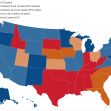As all eyes are on the conservative-majority Supreme Court as they ponder the fate of the landmark 1973 Roe v. Wade decision that made abortion legal in the US, the Food and Drug Administration (FDA) announced on Thursday they are permanently lifting restriction to abortion medication, including mifepristone, which is one of two pills used in the procedure.
The new FDA decision means patients can receive abortion pills in the mail and not be required to visit health providers in person. Medication abortions work on women who are up to ten weeks pregnant. This medication abortion is considered to be safe and offers women the ability for women to terminate their pregnancies in the privacy of their homes. To get the abortion pill, women must have a telehealth appointment with a provider approved to prescribe the abortion medication, who will then send them to the patient via mail.
The abortion pill was legalized by the FDA after being approved in 2000. Soon after, the usage of abortion medication grew. The Centers for Disease Control and Prevention reported last month that 42 percent of all abortions prior to ten weeks gestation occurred with abortion medication.
This new FDA decision to permanently allow telehealth and mailed abortion medications is new. Before 2020, anyone wanting to receive the abortion pill had to visit a specially trained health professional in person, before being offered the medication.
With the arrival of the pandemic, however, the FDA temporarily removed the in-person requirement for women to receive the abortion medication, after a swift court. With this new permanent approval for abortion pills by mail, the current national rift, as seen in the controversial new Texas abortion laws and the Supreme Court’s revisiting of Roe v. Wade, is growing.
Though the FDA may approve the abortion pill to be mailed, a total of about twenty states currently ban the medication. Legal experts expect those states, including Texas, numerous southern and some Midwest states. And, if Roe v Wade is overturned, these twenty-one states already have laws or amendments in place that would assist them in banning abortion pills.
As of today, nine states already have an abortion ban in place in spite of Roe v. Wade, and a dozen more states are poised to make abortions illegal if Roe V. Wade is overturned by the Supreme Court. Numerous other states have various abortion bans on the books as well.
Despite the FDA's permanent approval of the abortion pill being mailed to women up to ten weeks pregnant, there is a national split about abortion laws looming across the US.
Currently, there are legal roadblocks in states primed to ban all abortions if Roe v. Wade is overturned. There are different types of anti-abortion laws in place, such as:
Pre-Roe ban: Several states never removed their anti-abortion laws after the 1973 Roe v. Wade decision to legalize abortion. States with a Pre-Roe ban include: Alabama, Arizona, Arkansas, Michigan, Mississippi, Oklahoma, Texas, West Virginia, and Wisconsin.
Trigger ban: This law was created to be ready and “triggered” if Roe v. Wade is overturned at any time, so a state can immediately make abortions illegal. States with a Trigger ban include: Arkansas, Idaho, Kentucky, Louisiana, Mississippi, Missouri, North Dakota, Oklahoma, South Dakota, Tennessee, and Utah.
In addition to Texas, five other states are expected to ban abortion fully if allowed by the Supreme Court, including Florida, Wyoming, Nebraska, Indiana and Montana. These five states have numerous cases on the books of trying to dramatically restrict legal abortions.
In contrast, states such as California and New York are not only beefing up access to legal abortions but also are expected to welcome out-of-state women into their states for abortions if Roe v. Wade is overturned.
With the new FDA permanent approval of the abortion medication as a mail-in solution for pregnant women seeking an abortion, some anti-abortion groups are speaking out.
“The Biden administration policy allows for dangerous at-home, do-it-yourself abortions without necessary medical oversight,” said anti-abortion rights group Susan B. Anthony List.
In response to such statements, the FDA said via their spokesperson, “The agency conducted a comprehensive review of the published literature, relevant safety and adverse event data, and information provided by advocacy groups, individuals and the applicants to reach this decision.”






